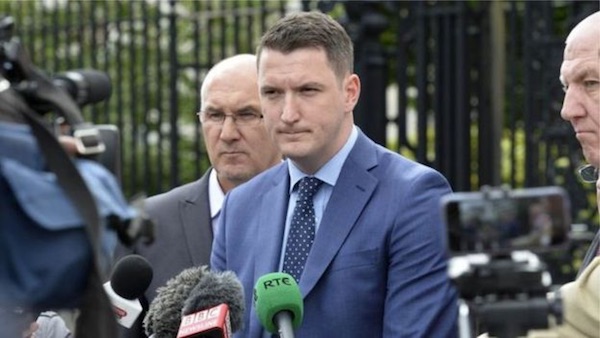
The widow of murdered defence lawyer Pat Finucane has been granted permission to take her bid for a public inquiry into his death to the highest court in England.
The 39-year-old Catholic was shot by loyalist paramilitaries, operating in collusion with the British state, in front of his young family at their home in Belfast in February 1989.
Geraldine Finucane is challenging former Prime Minister David Cameron’s decision not to hold a public inquiry. She has described a 2012 report commissioned by the British government as a “whitewash” and has pointed out that a previous administration - Tony’s Blair’s Labour government - had promised a public inquiry would be held.
Earlier this year, her long-running legal challenge was dismissed by the Court of Appeal in Belfast. It ruled ministers were entitled to ignore the promises of previous governments.
But on Wednesday afternoon, the family were notified that a committee of Supreme Court Justices have granted Mrs Finucane permission to appeal against the Tories refusal to honour their commitment to a public inquiry.
Peter Madden, of Madden and Finucane, said: “The only way that the full truth about Pat’s murder can be firmly established, and the extent to which a policy of extra-judicial assassination of which Pat was a victim was authorised by government, is by a full transparent public inquiry where witnesses and documents are subject to intense scrutiny.
“We will seek to persuade the Supreme Court at the hearing of this appeal that David Cameron acted unlawfully in refusing a public inquiry and that the court should quash his decision.”
John Finucane (pictured) said the family was delighted with the court’s “very significant” decision.
“Our argument has obviously resonated with the court that they feel these questions do warrant a full hearing and our family’s position is very clear,” he told BBC radio.
“We believe there remain many unanswered questions into the circumstances surrounding the murder of my father. The entire methodology of [the 2012 de Silva report] is something that should rightfully be criticised.
“What we were promised by the British government, along with other families, was that if a judge found that there was enough evidence to warrant a public inquiry, the relevant government would conduct and enact that inquiry.”
He pointed out that promised public inquiries had gone ahead in other, less controversial cases. “The only case that sits on the shelf is that of my father,” he said.
MOUNT VERNON COLLUSION
The PSNI meanwhile have been given a final deadline to disclose all relevant police files in a major High Court action over alleged collusion with a loyalist paramilitary agent suspected of up to 15 murders.
The agent is identified in the case only as ‘Informant 1’.
A judge warned that failure to adhere to deliver the files by October 1 will result in him striking out the PSNI’s defence to a claim brought by a north Belfast man who survived two attempts on his life by a police agent who was acting in collusion with the unionist paramilitary UVF.
John Flynn, 57, is suing the PSNI over murder bids carried out by the agent who operated in the Mount Vernon area of Belfast. Mr Flynn’s action was triggered by the findings of Police Ombudsman Nuala O’Loan that some Special Branch officers colluded with loyalist killers.
As part of the lawsuit Mr Flynn’s lawyers are continuing to seek access to PSNI documents. They argued a police admission of partial liability was a tactical move to avoid handing over all files on the informant and cover over the full extent of alleged collusion.
An affidavit filed by Mr Flynn claimed the RUC/PSNI either failed to arrest the agent for the murders and other crimes or else conducted “sham” interviews, despite knowing he was a leading UVF figure.
Rejecting a police application for more time to meet discovery obligations, Mr Justice Stephens said: “Years have passed without compliance and there is no clear acceptable plan for future compliance.”
![[Irish Republican News]](https://republican-news.org/graphics/title_gifs/rn.gif)
![[Irish Republican News]](https://republican-news.org/graphics/title_gifs/harp.gif)

